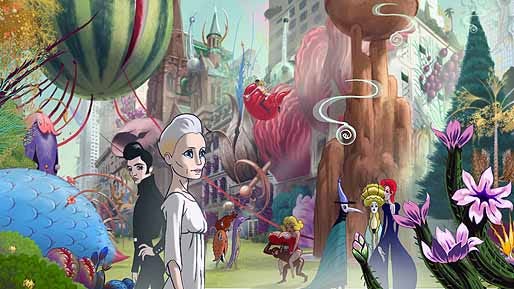The Congress

As media technology becomes more advanced, the boundaries of film are pushed further and the lines between art and science become more blurred. In recent years, films like "Dawn of the Planet of the Apes" and "The Lord of the Rings" have raised questions about whether a CGI, motion-capture performance can be Oscar-worthy. That raises questions like whether computers could someday replace actors ... and even if it was possible, is it something that we would even want to consider?
Director Ari Folman ("Waltz with Bashir") tackles these questions and much, much more in "The Congress," a live-action / animation science-fiction film (loosely) based on Stanislaw Lem's novel "The Futurological Congress." The film stars Robin Wright ("The Princess Bride") as an alternate reality version of herself. The fictional Robin Wright of "The Congress" is haunted by "bad choices" in both her career and life, and has disappointed so many in the ruthless movie industry that she can no longer find any work.
One day, she is approached by Jeff Green (Danny Huston), a callous bully of an executive at Miramount studios. Green offers her what he describes as "the last contract she'll ever have" — a contract to sell the film rights to her digital persona. The studio is able to digitally scan and capture not only her appearance but her emotions and personality and then make films using only this computer-generated avatar (a sort of super-advanced version of Coachella's Tupac hologram in 2012). Miramount is willing to pay her a fortune, but in addition to all the ethical and aesthetic questions the process raises, the contract also includes a clause that prevents Wright from ever performing again.
Wright struggles with this decision as any actor or artist would, but ultimately agrees as she needs money to help her son, Aaron, who is slowly going blind and deaf as a result of a genetic disorder. The first act ends with Wright being placed in a chamber for scanning as her agent, played by Harvey Keitel, gives an extended monologue designed to elicit the necessary emotional responses from the actress. As the monologue continues, he mercilessly catalogues all her bad choices and regrets, and as Wright breaks down, you truly get the sense she is getting paid to have her soul ripped from her.
Flash forward 20 years, and Wright returns to Miramount to renew the contract and speak at The Futurist Congress the studio is hosting. The Congress is being held in an "animated zone" — a place where the studio gives people chemicals that allow them to hallucinate themselves and their surroundings however they wish. Wright is repulsed by the fact that Miramount has turned identity into a chemical product and gives an impassioned speech rebuking and enraging the audience at the Congress. Moments later, the Congress is attacked by rebels fighting against Miramount's frightening new technology. During the attack, Wright is helped by Dylan (Jon Hamm) the former lead animator for Wright's digital movie-star persona, who has fallen in love with the real person. Despite Dylan's help, Wright falls victim to an overdose of hallucinogenic chemicals. Unable to treat her condition with current medicine, doctors put her in a state of suspended animation.
Flash forward another 20 years, and Wright awakens to find that the illusory (animated) world has all but replaced the real one. Millions live lives free of restraint or want as they can simply imagine themselves and their surroundings as anything they want it to be. She falls in love with Dylan but soon learns that she cannot find her son Aaron in this new world. It is unknown if he exists in the animated world or still remains in the real one. Wright must then decide whether to give up Dylan and the happiness she found in virtual reality in order to be reunited with her son.
"The Congress" is a thought-provoking film that raises many questions ranging from contemporary (Can anyone "own" a likeness, an identity, or an idea?) to existential (If perception is reality, is an artificial reality worth it if it means everyone is happy and war and poverty are eliminated?). In some ways "The Congress" reminds of Richard Linklater's "Waking Life," only with a more dystopian sci-fi bent.
The second act is a psychedelic muddle, partly by design as we are meant to question the differences between dream and reality, and partly because it simply asks a lot of open-ended, trippy questions about morality, ego and free will but doesn't linger on them long enough to suggest any answers. Also distracting is the quality of the animated sequences, which are a little cartoonish for a science-fiction film about alternate reality. Perhaps it is an homage to '60s psychedelia, or a function of a lower budget, but the animation is closer to "Fritz the Cat" on the animation spectrum than it is "Avatar." It's not bad, but with animation today at such a high level of artistry, it's a bit jarring to see styles used more reminiscent of "Duckman" than "Akira."
Overall, "The Congress" is an entertaining trip into the meta aspects of the film industry, intellectual property, and existential angst as opposed to a detailed, plot-driven story.
"The Congress" is available on VOD and Blu-ray + Digital Download on December 2nd. Blu-ray extras were not available for review but include:
* Commentary track by director Ari Folman * Interview with Robin Wright * 12-page booklet * Theatrical trailer * Promotional spot * HD Digital Download of the film
Film: 3.5 Yaps Extras: N/A
[youtube http://www.youtube.com/watch?v=3HD8w070hXE?rel=0&w=514&h=289]


